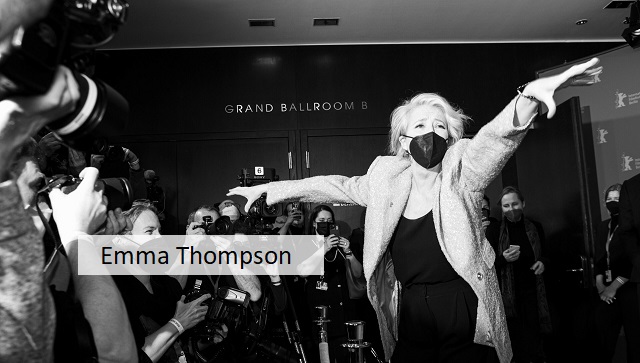Surely she jests: Emma Thompson’s latest film glorifies sex work

Why, O why, did she ever accept this demeaning role?
At the premiere of her new film at the Berlinale International Film Festival in Germany, Dame Emma Thompson, 62, revealed that Good Luck To You, Leo Grande was probably the most difficult role of her career.
In the film, which The Guardian describes as a “charming comedy”, she plays a retired widow who hires a young male prostitute named Leo Grande in the hope of a night of love and self-discovery.
Her part required her to strip off and look at herself in the mirror. She told Variety Magazine: “You ask any woman to do that, I bet you 9.9 times out of 10 they won’t be able to do it. But do it on camera? Forget it. We’re used to not liking our bodies. We’ve been trained to hate our bodies from very early on because they don’t match the impossible and actually cruel ideals that we are presented with.”
“It was actually really brave of me,” she told the media.
If stripping naked and spending the night with a complete stranger raises the self-esteem, then strippers, porn artistes, and prostitutes must have the highest self-esteem on record. The reality is that such women often lead tragic lives.
Thompson’s argument seems to be that women suffer from having a false ideal of female beauty imposed upon them, and that the briefest of reality checks suggests that those who constantly remodel themselves with plastic surgery and other artificial aids must be suffering from a severe lack of self-esteem.
The film adopts the tired trope of liberation through sex that should have died with Lady Chatterley’s Lover. In the updated version, Lady Constance becomes Nancy, a retired religious studies teacher. In my experience, religious studies teachers have no need or indeed desire to fret about their self-esteem.
Having been garlanded with honours during her acting career — two Academy Awards, two Golden Globe Awards, two British Academy Film Awards — surely Dame Emma does not need to take a part in something that must look as tawdry as it sounds. Why didn’t she promote the same kind of life-affirming cinematic triumph as Sense and Sensibility (1995), for which she also wrote the screenplay, and which was rightly showered with accolades, including her own well-deserved Oscar?
Contrary to her assertions, most women will not remember being “trained to hate our bodies from a young age”. Her claim sits strangely with feminist criticisms of the parental tendency to spoil little girls and dress them attractively. But this is the kind of stale, half-baked feminist theory from the 1970s that also encouraged women to trample on the right to life of their own unborn children.
Now, we are assured that abortion can be an “empowering” and even a “beautifully boring” experience by those who have nothing to say about the appalling phenomenon of sex-selective abortion, although it impacts most heavily on unborn females and must surely rank as the most egregious form of discrimination ever devised in the history of misogyny.
In reality, as most women discover by (often bitter) experience, their true worth lies in having children or, if sadly unable to do so, in caring for them and for others. They even discover the astonishing truth that being paid for doing so does not increase their worth but diminishes it; moreover, that disposing of their children, often at the behest of those stronger than them, far from being empowering, only empowers the strong at their own expense.
In feminist terms, an ageing woman who can afford to hire a prostitute must be “empowered” by the experience, regardless of the fact that this also justifies the ageing man who hires a female prostitute to “empower” himself. How grateful Jeffrey Epstein would be to have his hobby validated by feminist theory.
Amazingly, in the light of everything we have read about Mr Epstein and Ghislaine Maxwell, Australian director Sophie Hyde hopes Leo Grande will help normalize portrayals of prostitution in the media.
“We see onscreen so much representation of sex work that is deeply problematic, really negative portrayals or the ‘Pretty Woman’ thing where someone falls in love and finally gets to leave and be rescued or that it’s all dangerous,” Hyde told IndieWire. “Coming to understand how varied it is and how normal and ordinary it is, as well, was brilliant.”
For these intelligent women to believe that salacious entertainment will help their less fortunate sisters is not brave but naive in the extreme. More likely it will encourage men to treat women as rubbish – to use them and dispose of them, and to feel better about themselves afterwards.
I’m used to celebs lecturing me on everything from saving whales to saving toilet paper, but this is the kind of feminist luvvie lunacy that women can do without.


Leave a Reply
Want to join the discussion?Feel free to contribute!